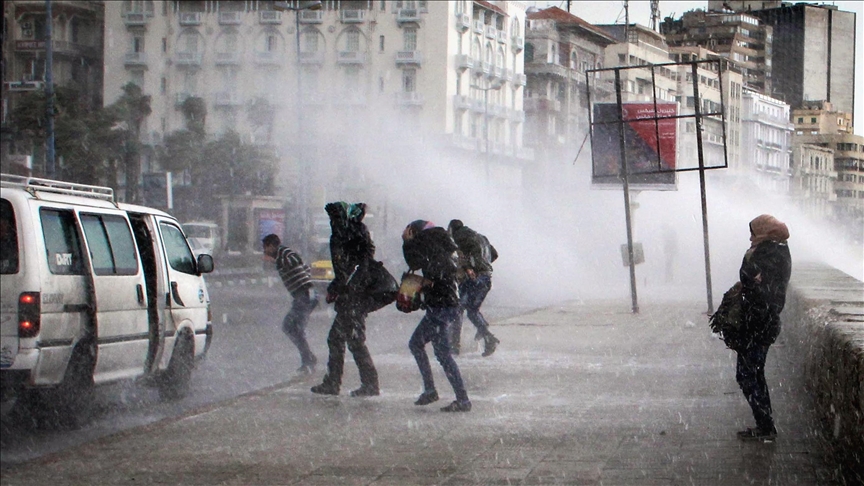Exit from War Cabinet looms
JERUSALEM
Speculation is mounting in Israel that Benny Gantz, the leader of the National Unity Party, may step down from the War Cabinet led by Prime Minister Benjamin Netanyahu even before the June 8 deadline he initially set.
Recent public opinion polls revealing a significant drop in the party’s popularity underscore these speculations.
The most recent of these surveys, conducted by the Lazar Institute poll on a random sample of 502 Israelis with an estimated error rate of 4.4%, published by the daily Maariv on Friday, suggests that if elections were held now, the National Unity Party would secure 25 out of 120 seats in the Knesset (parliament).
The poll revealed a resurgence in the Likud Party’s fortunes under Netanyahu’s leadership, following a recent downturn. The results suggest that if elections were held today, the Likud party would secure 21 seats.
The National Unity Party, which previously peaked at 41 seats in recent months, is experiencing a steady decline, securing only 25 seats this week, said Maariv, adding that the Likud, which had dropped to its lowest level of 17 seats, rebounded to 22 seats this week.
“Amid looming prospects of dissolving the national unity government, heightened military operations in Rafah, escalating skirmishes in the north, and ongoing deadlock over the issue of hostages, Gantz’s party faces collapse while Netanyahu’s party secures its largest seat count since the onset of the war on Oct. 7, 2023,” Maariv said.
However, the poll suggests that if elections were held today, the pro-Netanyahu camp would secure 53 seats, while the opposition camp would garner 58 seats, with Arab representatives gaining nine seats.
According to the poll, 41% of respondents expressed a preference for Gantz as the prime minister, 37% favored Netanyahu, and 22% did not specify.
Forming a government in Israel requires obtaining the confidence of at least 61 members of the Knesset.
June 8 deadline
Early elections are unlikely in the foreseeable future, as Netanyahu has rejected the idea amid the ongoing war on Gaza.
Gantz on May 18 said he would withdraw from Netanyahu’s government by June 8 unless a “clear and comprehensive plan” addressing the situation in the Gaza Strip, including the return of hostages, was developed.
The Israeli Public Broadcasting Corporation reported on Friday that Gantz might withdraw from the government before the specified date.
“In political circles, there is growing speculation that the National Unity Party will exit the government before June 8, the deadline set by Benny Gantz for Netanyahu to meet his demands,” it said.
Sources within Gantz’s party were quoted as saying: “If the prime minister had been willing to negotiate an agreed-upon election date, it would have been feasible to broaden the government and make more informed decisions driven by national interest rather than fear of government collapse,” according to the same source.
Gantz’s exit from the War Cabinet marks the end of its “emergency” status, returning the government to its pre-war configuration.
Gantz entered the War Cabinet led by Netanyahu shortly after a Hamas attack on Oct. 7, 2023, despite not being part of the government coalition prior to that.
The War Cabinet comprises Netanyahu, Defense Minister Yoav Gallant, and former defense chief Gantz.
Former Chief of Staff Gadi Eisenkot and Minister of Strategic Affairs Ron Dermer participate in the cabinet as observers.
On Thursday, the National Unity Party presented a draft bill to the Knesset, proposing the dissolution of the Knesset and the scheduling of early elections for the coming October.
However, the Israeli daily Haaretz reported on Friday that the party, led by Gantz, is unlikely to bring the draft law to a vote in the Knesset without a secured majority, as draft laws that have been discussed and rejected in the Knesset cannot be brought to a vote again for six months.
With the parties supporting Netanyahu holding a majority of 64 votes in the current Knesset, the bill’s chances of success diminish.
Israel has continued its brutal offensive on Gaza since an attack by Hamas on Oct. 7, despite a UN Security Council resolution demanding an immediate cease-fire.
Around 36,400 Palestinians have since been killed in Gaza, the vast majority being women and children, and more than 82,400 others injured, according to local health authorities.
Nearly eight months into the Israeli war, vast swathes of Gaza lay in ruins amid a crippling blockade of food, clean water, and medicine.
Israel stands accused of genocide at the International Court of Justice, which in its latest ruling ordered it to immediately halt its operation in Rafah, where over a million Palestinians had sought refuge from the war before it was invaded on May 6.
* Writing by Ikram Kouachi
Anadolu Agency website contains only a portion of the news stories offered to subscribers in the AA News Broadcasting System (HAS), and in summarized form. Please contact us for subscription options.




